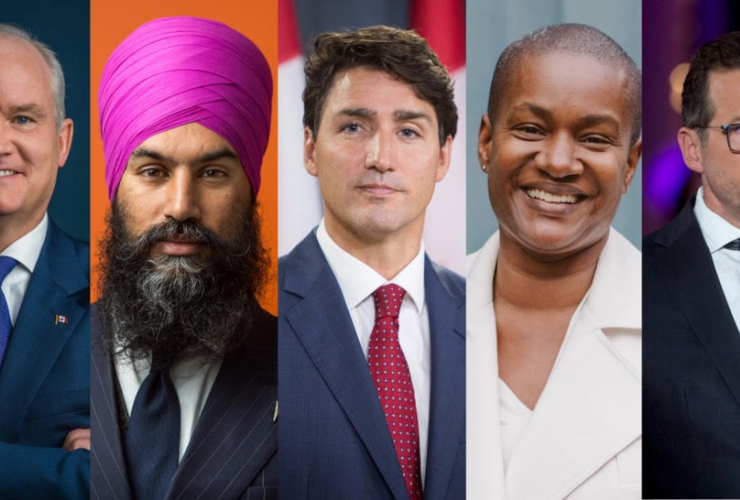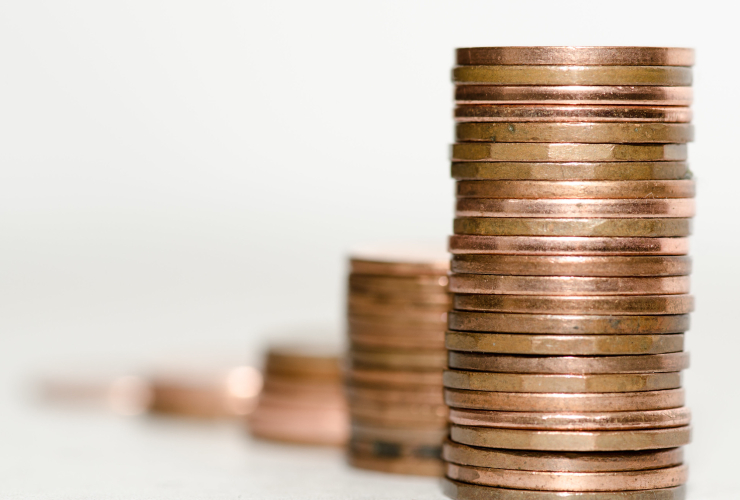A growing number of Canadians have expressed a desire for a fairer tax system, and a recent poll by Abacus Data revealed people are willing to change how they vote over this issue.
The poll indicates strong support for NDP policies, which may leave other parties playing catch-up at a time when Canadians feel the COVID-19 pandemic is exacerbating inequality.
Federal Liberal Party Leader Justin Trudeau critiqued the NDP’s plan to pay for its $214-billion platform by taxing corporations and the ultra-wealthy.
“The idea that you can go with unlimited zeal against the successful and wealthy in this country to pay for everything else is an idea that reaches its limits at one point. And I don’t think the NDP get that,” Trudeau said at a La Prairie, Que., campaign stop last weekend.
But federal NDP Leader Jagmeet Singh said this is a limited way of thinking, and criticized Trudeau’s government by referencing a 2019 Parliamentary Budget Office (PBO) report that found up to $25 billion a year in tax revenue is lost from corporations that avoid paying their share of taxes.
He told voters in Sudbury, Ont., his government would “end Trudeau’s free ride for big corporations by closing loopholes and cracking down on big corporations avoiding their fair share of taxes,” pledging to use tax revenue for “cheaper prescription drug costs, more affordable homes and better health care for families and seniors.”
The Abacus Data poll was based on NDP policy from the 2019 election, and found 89 per cent of Canadians support the NDP’s proposed tax of one per cent paid on wealth over $20 million as part of Canada’s pandemic recovery, and 92 per cent support closing tax loopholes and making it harder for corporations to strategically book profits in tax havens.
The issue may have the power to sway voters: 89 per cent of Canadians surveyed said they would definitely or probably consider voting for a party promising to ensure everyone pays their fair share by increasing taxes on the wealthy and large, profitable corporations.
Here is where the five main federal parties stand on tax fairness.
Widespread support for NDP policy
The NDP’s platform includes big-ticket promises like universal pharmacare and dental care, a guaranteed livable income, and student debt cancellation. The PBO estimates the cost of these promises to be $214 billion over the next five years, and the NDP says it plans to offset that spending with $166 billion in revenue collected from new taxes aimed at the rich and large, profitable corporations.
The Liberals and Conservatives have a track record of blocking the NDP’s attempts to implement a wealth tax.
In November 2020, the Liberals, Conservatives, and Bloc Québécois voted against Singh’s opposition day motion to implement a one per cent tax on wealth over $20 million and an excess-profits tax on “big corporations profiteering from the pandemic.” The NDP has now upped the ante and is proposing a more ambitious wealth tax in the midst of the 2021 federal election to build off the widespread support for its 2019 policies.
“I believe because the Liberals and Conservatives are on the record blocking (Singh) in any attempt to have a fair tax system that they will pay a price ultimately,” said NDP finance critic Peter Julian.
Key initiatives
- Wealth tax: An annual tax of one per cent on wealth over $10 million. This would rake in more money than the NDP’s 2019 campaign promise of a one per cent tax on wealth over $20 million, pulling in an estimated $60.1 billion over five years, according to the PBO.
- Foreign buyers tax: To address housing speculation, the NDP would introduce a 20 per cent tax on purchases of residential property by foreign corporations or people who are not citizens or permanent residents of Canada. The PBO says this would generate an estimated $2.4 billion in government revenue from now until 2026. The Liberals’ 2021 federal budget included a one per cent vacant homes tax, set to be implemented in 2022.
- COVID-19 excess profit tax: A temporary 15 per cent tax on corporations that earned over $10 million in revenues for at least one year between 2016 and 2020. This tax would target “large corporations that took publicly funded COVID-19 wage subsidies” to pay executive bonuses, execute stock buy-backs or pay shareholder dividends. The PBO estimates this tax would yield $14.6 billion next year.
- Corporate tax: Would roll corporate tax cuts back from 15 to 18 per cent — the same as 2010 levels — while maintaining the current small business tax rate. The PBO says the increased corporate tax would generate an estimated $25.9 billion in revenue over the next five years.
- Capital gains: Capital gains tax will increase from 50 per cent to 75 per cent. This would raise an estimated $44.7 billion over the next five years, according to the PBO. The NDP is the only party that has committed to increasing the capital gains inclusion rate, though the Green Party said it would address “capital gains tax loopholes.”
- Top marginal tax rate: Increase the top marginal tax rate — which applies to taxable income over $216,511 in 2021 — from 33 to 35 per cent. This would generate $3.4 billion, according to the PBO estimate.
- Crackdown on corporations: Address tax havens by forcing corporations to “prove the economic substance” of offshore transactions, a measure the PBO estimates would result in $12.2 billion in revenue over five years. It would also close tax loopholes like the stock option deduction and review “tax expenditures that don’t benefit everyday Canadians.”
- CRA enforcement: Boost compliance funding to the Canada Revenue Agency’s enforcement section dealing with international and corporate taxation to ensure that companies can’t evade new measures.
Reality checks
- Some critics, like the Fraser Institute, say wealth taxes discourage savings and investments and lower long-term growth. A report from the Fraser Institute argues wealth taxes are also costly to administer and collect, partly because “it creates an incentive for the taxpayer to minimize reported wealth and asset prices.” For this reason, cracking down on tax evasion will be key.
Liberals promise to tax banks, insurance companies
The federal Liberal Party has been using the language of tax fairness this election campaign, promising to tax large banks and insurance companies to aid Canada’s recovery from COVID-19. But the party’s platform and talk of tax fairness does not extend to a wealth tax.
Recently, Trudeau slammed the NDP’s plan to tax the rich, saying that going with “unlimited zeal against the successful and wealthy” to pay for its platform would eventually reach its limit.
When the Trudeau government first came to power, it took immediate action to raise taxes on the wealthiest one per cent in order to cut taxes for the middle class, says Liberal Party spokesperson Alex Deslongchamps, noting other political parties voted against it at the time. In 2019, it also introduced a three per cent tax on large digital companies with more than $1 billion in international revenues, and in June, made changes to the Income Tax Act to limit the benefit of the employee stock option deductions taxed effectively at the capital gains rate, introducing a $200,000 cap.
Despite these actions, the Abacus Data poll found 64 per cent think Trudeau’s government hasn’t done enough to ensure everyone pays their fair share in taxes, including 49 per cent of people who would consider voting for the Liberals.
Key initiatives
- Corporate surtax: Introduce a three per cent surtax on earnings over $1 billion for banks and insurance companies, which would bring in an estimated $3.2 billion over five years, according to the PBO.
- Create a minimum tax rule: Those earning more than $216,511 — the top tax bracket — would pay a 15 per cent minimum tax, removing the ability to use excessive deductions and credits to “artificially pay no tax.” This measure would generate an estimated $1.7 billion over five years, according to the PBO estimate.
- Luxury tax: As outlined in Budget 2021, the party would introduce a luxury tax on new cars and private aircraft worth at least $100,000 and boats for personal use retailing for over $250,000. The NDP and Green Party have also pledged to introduce a luxury tax.
- Vacant homes tax: The 2021 federal budget promised a one per cent tax “on the value of non-resident, non-Canadian owned residential real estate considered to be vacant or underused.” The Liberals began consultations on the proposal in August, and it is set to go into effect Jan. 1, 2022.
- Fund the CRA: lncrease the CRA’s resources by up to $1 billion per year in order to close Canada’s tax gap so it can combat aggressive tax planning and tax avoidance.
- Anti-flipping tax: To reduce speculative demand and “cool excessive price growth” in the housing market, the Liberals would establish a tax requiring most properties to be kept for 12 months.
- Anti-avoidance: Improve anti-avoidance rules to stop large multinational companies from shopping for lower tax rates by constructing complicated schemes between countries.
Reality checks
- Critics claim the anti-flipping tax is a capital gains tax, and in the leaders’ debate, Conservative Leader Erin O’Toole played into this, saying: “Canadians are worried (Trudeau is) going to be taxing their primary home sales.” However, there are exceptions to the 12-month requirement that would allow Canadians to sell their home if it is damaged by a natural disaster or if the owner has an employment change, among other factors. It remains to be seen how these exemptions will be judged and enforced.
- Data from the CRA shows its recent efforts to combat tax evasion by the super-rich resulted in zero prosecutions or convictions since 2015, putting the Liberals in hot water.
Green Party calls for a big corporate tax increase
The Green Party’s platform lays out steps to fairly distribute the burden of taxation in Canada by increasing corporate taxes, cracking down on transnational e-commerce companies, and moving toward tax reform.
Key initiatives
- Wealth tax: Apply a one per cent tax on net (family) wealth above $20 million.
- Corporate tax: Increase federal corporate tax from 15 to 21 per cent, bringing it in line with the U.S. The platform also proposes eliminating the 50 per cent corporate expense deduction on meals and entertainment, which can include things like season tickets to sporting events.
- Bank tax: Charge a five per cent surtax on commercial bank profits (credit unions, caisses populaires, and co-ops would be exempted) and use the revenue for the transition to a green, renewable economy.
- E-commerce: Tax transnational e-commerce companies — like Facebook, Google, Amazon, and Netflix — by requiring them to register, collect and remit taxes where a product or service is consumed.
- Empty home tax: Foreign and corporate residential property owners who leave buildings and units vacant will be taxed.
- Tax reform: Establish a Federal Tax Commission to “analyze the tax system for fairness and accessibility, based on the principle of progressive taxation,” including identifying a way to tax cryptocurrencies.
- Close loopholes: Like the NDP, the Green Party pledges to close the stock option loophole, which allows executives to only pay half the rate of income tax on stock options that are part of their remuneration package. It would also close the capital gains loophole (excluding primary residences), which currently allows individuals and corporations to only add half of their capital gains to their taxable income. In the meantime, Canadians who only have employment income pay taxes on their entire income.
Reality checks
- The platform does not contain specific numbers for the empty home tax or e-commerce taxes.
Conservatives promise tax ‘holiday’
The CPC has opposed NDP attempts to implement a wealth tax, and its platform holds no such promises beyond pledging to “stand up for those who don’t have a voice,” like working and middle-class Canadians, new Canadians and small business owners. The platform doesn’t contain any changes that would increase taxes for individual Canadians, but no details are provided on how the party’s key initiatives would benefit these groups, either.
Key initiatives
- Digital sales tax: Impose a sales tax and digital sales tax on three per cent of foreign tech companies’ gross revenue in Canada if they do not pay corporate income tax.
- GST “holiday”: O’Toole proposed a month-long holiday in December on the five per cent federal goods and services tax. The measure is intended to help families and small businesses recover by boosting retail spending while also making goods more affordable for everyday Canadians.
- Fund the CRA: Provide more funding to the CRA, increasing to $750 million per year, to crack down on enforcing taxation of multinational firms, large corporations, international taxation, and other tax evasion. It says the extra cost will be more than compensated for because tax compliance will be higher, thus increasing taxes collected by the government.
Reality checks
- The GST holiday has received mixed reviews, with the Canadian Federation of Independent Business telling CBC the tax cut seems “gimmicky” and questioning the feasibility of the idea, adding consumers may refrain from making purchases in the fall as they wait for the GST holiday.
Natasha Bulowski / Local Journalism Initiative / Canada’s National Observer








Comments